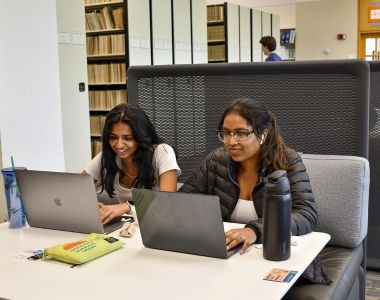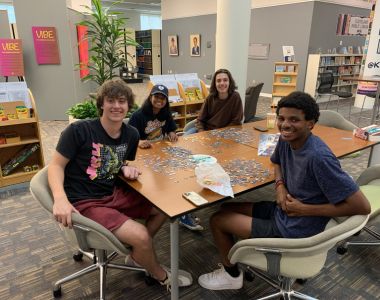Throughout the academic year, Kelvin Smith Library (KSL) is a hub of activity. And though there weren’t as many students, the summer months were just as busy.
Physical spaces were transformed to provide more seating options and reservable private offices, and librarians carefully curated new content and expanded digital scholarship programming to support the growing needs of the Case Western Reserve University community.
New spaces to explore
KSL has added 50 new seats to its study areas since May, including four adjustable booths that allow for a variety of seating positions.

“All of our physical seating and space changes are student-centered and based on their feedback,” said Yolanda Cooper, vice provost and the Lindseth Family University Librarian. “We’ve created areas for collaboration and spaces for those seeking solitude. This is all part of our initiative to build a more inclusive environment.”
Those looking for privacy will find five individual study/office spaces on the third floor. These reservable rooms are equipped with a desk, chair and power outlet.
The first floor’s Freedman Collaboration Commons is now home to a reservable video conferencing room featuring a desk, chair, power outlet and whiteboard. It provides a professional space for conducting meetings, interviews or collaborating with colleagues outside of Northeast Ohio.

Also located on the first floor near Cramelot Cafe and the Cleveland Public Library Collection is the new Zen Zone. Its design allows students to reinvigorate their minds and bodies through chair stretching, coloring pages, puzzles, games, gratitude journaling and take-what-you-need encouragement cards.
More than just books
Librarians secured new, high-quality content over the summer, strategically taking advantage of publisher and vendor discounts.
“We have been very intentional in how we spend new money we have received from university administration,” said Cooper. “We gathered feedback from faculty, staff and students to identify unmet needs in the collection to reach the widest audience in our community.”
Cooper says one of the most impactful purchases is the Taylor & Francis all journals package that provides access to over 2,000 new journal titles.
Events, exhibits and programming
Well-liked library programs such as trivia night and therapy dog sessions will return this fall, as well as a zine-making workshop and a tea party with the Western Reserve Herb Society. Planned exhibits will showcase Hispanic Heritage Month, photography from Donald Black Jr. and a history of LGBTQ activism and support at CWRU.
The newly added Early Career Research, Visibility and Publishing Series is open to all graduate, PhD students and postdocs and provides insights into successfully navigating the publication process.
“This series will help researchers build their own scholarly brand,” said Daniela Solomon, research and engagement librarian. “We’ve curated experts and guest speakers to teach best practices for planning research, finding and managing resources, learning how to use digital tools for analysis, leveraging author rights and understanding the benefits of open science.“
The new Digital Scholarship Workshop Series introduces participants to the methods and tools of digital scholarship, exploring mapping, data visualization, text analysis, data management and more using popular, well-supported research software platforms such as R, Python and ArcGIS.
View a full schedule of KSL programming.
Coming soon
And, there is more to come in 2024. Two for-credit courses will be offered in the spring semester—taught by research and engagement librarians:
- “Navigating the Information Landscape: Misinformation on Social Media” meets the university seminar requirements and can be included in the SAGES writing portfolio (for students who are second-years or above). The class covers the fundamentals of information literacy—including how to read critically, evaluate resources, identify bias and understand how context can influence the accuracy of information.
- “Research & Writing for a Digital Public” will help students develop research and writing skills necessary to efficiently and effectively evaluate, use and contribute information in the digital landscape.
“The goal is to provide a thorough understanding of the digital world no matter your field of study, “ said Cooper. “From music to biochemistry, nursing to accounting, all students will benefit from these classes.”
